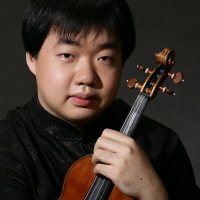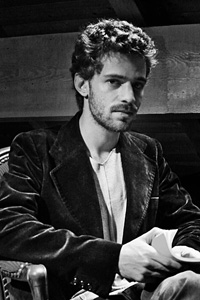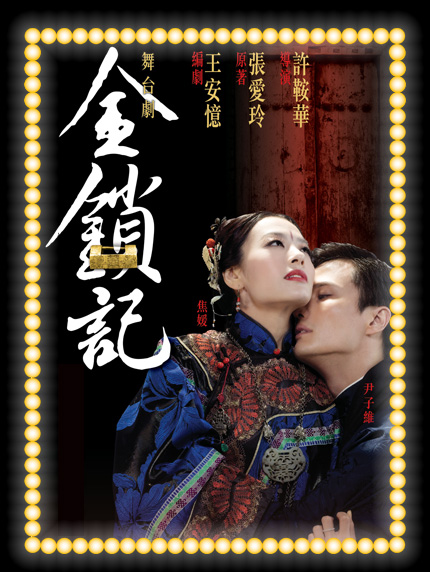 Concert Review: HKPO-Yang Tianwa-楊天媧
Concert Review: HKPO-Yang Tianwa-楊天媧October 23, 2010, CH
HKPO-Yang Tianwa-Perry So
Janacek-Dvorak-Sibelius
Official English website
楊天媧 2006
This was a concert I most wanted to hear. Usually I prefer to attend HKPO concerts on Fridays, as the orchestra are usually more committed for the first of the concert pair. But I could not this time. So, on Friday 10:30 pm I received a phone call that was ecstatic in praise of the concert. Perhaps that first-hand report raised my hopes too much, as the concert on Saturday did not entirely live up to promise.
 A Real Find
A Real FindMy first encounter of Yang Tianwa was from her first 2 Naxos Sarasate CDs (eventually there will be 7 CDs) which I borrowed from the library. All it took were a few notes to make me jump up from my seat and read everything in the booklet about the amazing violinist whom I had never heard of (the pianist is fantastic too). For here is the best Sarasate I have heard in a long time. The duo couldn't possibly have known all the obscure works when they recorded them, yet they played like they have lived with these pieces for years! Her fluid and utterly natural phrasing gave the pieces unusual breath. Her grasp of the Sarasate style is superior to most current violinist I can think of.
The Dvorak Violin Concerto is not often played in Hong Kong. Despite a little unsteadiness at the beginning, all the qualities that distinguished her Sarasate were gratifyingly present live. I was most impressed by her steady, singing tone, sure attack and sustain. Her natural phrasing revealed a maturity beyond her years. However, the wistful aspect of this concerto hides its difficulties, which are not in the notes but in expression and balance. Although she could be tender and delicate, the reading as a whole lacked a lyrical quality that should be inherent in the music. Part of this may be due to the accompaniment which, though tidy, emphasized drama rather than the dance elements. It should be noted that the orchestra was moderately reduced in the strings (only 22 violins, 8 violas, 6 celli and 4 basses), making the winds and brass more prominent in a "Germanic" style.
For encore she played a Ysaye piece, which more than the concerto showcased what this wonderful young violinist is all about: superb technique wedded to musical insight. All the Bachian counterpoints were clearly laid out but did not detract from the long lines and sumptuous tone. Marvelous!
The orchestra reverted to full-size for the Sibelius Symphony No. 2. This is a HKPO staple but this reading still managed to surprise me initially for the excellent playing and eloquent chording. Despite some unnecessary tempo manipulations, the first three movements had their shining moments, particularly felt in the almost sculptural brass chords. However, my worst fears about the inexperience of Perry So materialized in the last movements, where the various climaxes should gradually build up in power and intensity. Instead, Perry So could not manage the admittedly difficult task of tying the various episodes together and the movement as a whole was wildly incoherent. The quieter passages felt directionless, and the finale did not provide at all a sense of catharsis; a big deflation indeed. A cautious Janacek's Jealousy overture opened the concert.
There are a surprising number of personnel changes. Newcomers Colin Oldberg and Benjamin Moermond are now the trumpet and bassoon principals. Cor Anglais is now Sarah Turner. And Lisa Rogers is gone, so soon! there are now only 3 Chinese faces among the winds and brass. Sigh...
我第一次發現楊天媧是在圖書館。兩張 Naxos 的 Sarasate 小品吸引了我,不知道楊天媧是誰就借了回去。一聼之下就驚為天人。這些曲目極爲冷門, 但二人的演繹卻令我有耳熟能詳的感覺;這是一流的 Sarasate 演繹, 非時下所謂名家輕易能及!這兩張 CD 也燃燒了起來我對中國新星的希望。但這期待已久的音樂會卻因種種原因沒能盡興。
楊天媧技術上現場和錄音大致一樣, 琴音飽滿, 技巧扎實。減了弦樂手的樂隊突出了木管和銅管, 也沒掩蓋楊天媧, 但整體上 Dvorak 缺乏了抒情, 餘韻不足。其實 Dvorak 音樂好像不難,但要奏出活力, 有舞曲自然彈跳的感覺卻非易事。在這層次上,獨奏,指揮和樂隊都沒有達標, 可惜了。
Encore 的 Ysaye 就大大不一樣了。沒了樂隊的牽挂, 楊天媧的演繹自然流暢,技巧和音樂的表達兩者結合得天衣無縫。還是, 《 天媧無縫》? 僅此一曲,已是補償的甘露, 值囘票價。
下半場的 Sibelius 第二交響曲 開始得不錯,但沒能彌補終樂章渙散無章的演繹。 本是一浪推一浪的高潮,變了沒能連接上的幾個強聲片斷, 方向感的缺乏令到結尾變了反高潮, 煞是掃興。
Addendum: Interview by HKPO
很美好但很苦的音樂家生涯—小提琴家楊天媧(朱振威)(摘自HKPO)
先說一段小插曲:一開始想著在港樂辦公室與楊天媧用長途電話作訪問,結果花了很多時間預約
一個方便雙方的日子,到訪問時又遇著酒店電話線路繁忙。再次跟楊天媧用電郵聯絡,看著她的
電郵結尾那句「Sent from my iPhone」,靈機一動問道:「你有Skype嗎?」結果二十四小時內
我安坐家中完成訪問。
可是,你別因此想像楊天媧是Facebook上有過千「朋友」,一有空就在msn聊天的一般「八十
後」– 與她閒聊過後,才發現這在音樂家生涯中很難發生的。
那麼音樂家的生涯是怎樣?廿三歲的楊天媧說「很美好,但很苦!」
我的爸爸
我四歲開始拉琴,父親對我非常嚴格,每天都要我練琴。他這樣做很對的,否則我不能有今天的成就。
小時候,我不算很刻苦,很多練習曲目拉兩次,行了就算。我那時明白我有天賦,人家試十次才成功,我三次就行。人家五歲時坐上鋼琴不下來,我不是,我也想做其他事情。小時候看著人家放學去玩耍,爸爸卻來接我回去練琴。很多時候想看書,想跟其他人玩,但卻因為練琴而放棄,回想那段日子其實挺苦的。
當音樂家很苦的,但我現在很開心。如果我沒有當音樂家,可能現在會當白領吧,不過生活可能就不開心了。說到底,生活是由每個人自己決定的。
將來要是有孩子,我不會像我爸爸這樣嚴格把她訓練成音樂家。我可能會堅持,幫她到十三、四歲,然後就讓她選擇。天賦不是決定一切,性格來得更重要。
我的假期
音樂家的生涯很美好,但很苦。要能承受很大壓力,也要有嚴格生活規律。經常在不同國家往還,時時要克服時差,但只能睡至「我要起床」的時候,到放假時終於可以睡到「我想起床」,放假最好之處就是不用想時間。
不用演出的時候我通常留在家渡假。假期第一天我會整日躺在床上讀書喝茶,這樣做對我來說就是終於放假的訊號。我最喜歡閱讀,我還記得小時候我練琴時都在譜架上放著一本小說。一邊拉一邊讀,因為音樂我拉幾次就背下來了。但後來爸爸發現了,就把我的書都綁起來。
我甚麼類型的書都愛讀,小說、經典、犯罪故事、古代現代的統統都愛讀。現在讀著一本挪威小說家Lars Saabye Christensen的《The Half Brother》,男主角在二戰後長大,他的家庭表面上很普通,可是他的哥哥卻是母親在戰時被人強姦後所生的,是很曲折的故事。
我的工作讓我每天有四、五個小時都在「聽」音樂,空閒的時候就想靜下來。就算真的聽音樂也是工作需要,例如聽一些其他人演奏我將要演出的曲目。反而,我常常會聽有聲書。
我想音樂跟其他藝術如繪畫、電影、寫作都有共同目的,就是藝術家要向別人傳達訊息。對我來說,演奏時我就像一個導演在執導一齣戲,只是我在講述一個沒有文字沒有畫面的故事。
我的encore
我覺得如果這世界沒有了易沙意與巴赫,我實在不知道可以拉甚麼作encore!我不贊同拉完一首協奏曲之後又拉巴格尼尼或是韋尼奧斯基的炫技作品,之前已經有整首協奏曲給你表現自己,你已不需要再顯示你的實力了。我會想應該借encore的時候讓觀眾感受別的東西,而不只是一味的炫耀。
至於獨奏會,我就很愛拉奏馬思聰的《思鄉曲》作 encore,我就是愛其簡單的民間元素。其實大部份好的音樂都是來自民間,你看布拉姆斯與莫扎特一樣從民間音樂找尋音樂元素。因為這些民間音樂已是精華,也是來自生活。
德伏扎克的小提琴協奏曲給我最深印象是慢板樂章,就是因為充滿了民間音樂元素。憂鬱的風格就像一首民歌。而終樂章更似是一節民間舞蹈。以民間音樂為素材的話,意味著這首作品更貼近觀眾。我認為他的小提琴協奏曲比大提琴更具民族色彩,也更高貴細膩。
這首小提琴協奏曲在歐洲舞台其實很常出現,不過我發現在亞洲及北美似乎更流行他的大提琴協奏曲及交響曲,讓這首協奏曲好像在陰影之中。或許是這首協奏曲生不逢時,同年代有太多傑出的小提琴協奏曲了。
我的決心
「今天在倫敦,明天在巴黎,晚上八時才工作......」當音樂家聽起來很自由,可是一點也不自由。背後都是排得很滿的行程,而且不是你自己決定,演出可是責任。演奏工作只是不斷換地方,事實上看不到別的東西。
我也有用F a c e b o o k , 用化名的, 但只有廿四個朋友,都是真正的朋友。以前晚上還會用msn,現在也不怎麼用了。我很少找朋友的,住的地方周圍也是很少人居住的。平日也不出門,跟人聯絡也多靠電郵。的確, 工作上不斷會認識到新朋友, 可是很多時雖然合作愉快, 演出完了連繫就斷— 剛開始認識就要走,很可惜。有時去到一個地方演出,打電話給當地的朋友, 可是最後因為工作沒有時間約出來見面。事業正在往上走,是要吃點苦。
所以,當音樂家一定要有決心。
楊天媧最愛的小提琴家
我喜愛Adolf Busch與他的弦樂四重奏,還有Joseph Szigeti。我最喜歡Busch的貝多芬,他演奏出樂曲的最高境界。而Szigeti的布拉姆斯我認為是不可超越的!
之前為了演奏孟德爾遜協奏曲,聽了Jascha Heifetz,令我很驚奇,他的慢板樂章原來是我聽過最美的!不過他的首尾樂章卻不是我杯茶了。
楊天媧最難忘的演出
有一次很可怕的,那是在德國的演出。我還記得很清楚是2007年3月26日星期天,我那次幾乎忘了去演出!
話說那一次場音樂會是早上十一時舉行的,於是我八時起床。到了九時四十五左右我的經理人打電話給我,問我在哪兒,說演出快要開始,我才猛然醒起那時已經行夏令時間!換言之經理人打電話給我時是十時四十五分。但我還未吃早餐,還未更衣。我立即帶著小提琴與演出服飛奔到街上乘車到音樂廳。到我站在台上時我幾乎暈倒呢。
A Wonderful Struggle-Yang Tianwa’s life as a musician (Leon Chu)(from HKPO, with edits of some typos)
A brief Prelude. Originally, the idea was to conduct along-distance interview with Yang Tianwa by phone from the HKPO offi ce, but after the lengthy process of finding a convenient time, a problem with the hotel phone line prevented the interview from taking place. Email correspondence followed and it was then that I noticed a “sent from my iPhone” suffix. Hold on a minute; “Do you have Skype?” 24 hours later the interview was finished from the comfort of home.
Yet don’t let this lead you into thinking that she is a typical “post-80’s generation” young woman with over a thousand “friends” on Facebook and spending all her spare time chatting away on msn. I quickly realised that this doesn’t happen in a musician’s life.
So, what is a musician’s life like? According to 23-years- old Yang Tianwa; “It’s really wonderful, but it’s really tough!”
My Dad
I started playing the violin when I was four. My father was very strict, and made sure I practised every day. He was right to do that, otherwise I would not have achieved what I have. I was not an especially diligent child. Many of my exercises I just played a couple of times and stopped as soon as I could play them. Already by that time I realised I had some gifts; some people needed to try things 10 times, while I often succeeded after three. Other children managed to sit in front of the piano all day, I couldn’t. I wanted to do other things. When I was little, I had to watch other children going to play after school, while my dad would pick me up from school to practise. I often wanted to read books, to play with friends, but I had to give these all up because of the violin. Looking back, it was quite a tough time.
It is generally tough to be a musician, although I am really happy right now. If I hadn’t been a musician, I guess I might be working in an office, and I don’t think would be as happy, but at the end of the day, every one determines their own life choices.
If I was to have children I would not make the demands on them my dad made on me. But if they wanted to be musicians, I might insist on helping them until they are in their mid-teens and then leave them to choose. Talent does not dictate everything; personality is more important.
My Holidays
A musician’s life is tough but really wonderful. You have to manage a great deal of stress and lead a disciplined life. Travelling from country to country means constant adjustment of time zones. You can only sleep until you “need to get up”. When holidays come, you can finally sleep until you “want to get up”. The best thing about holidays is not having to think about time.
When I don’t need to perform, I tend to stay home. On holidays, the first day I would lie in bed all day, reading and drinking tea; to me that tells my brain that I am finally on holiday. I love reading. I remember when I was little, I would put a novel on the music stand and read while I played, as I was able to commit music to memory fairly quickly. Later my dad discovered me doing this and locked all my books away!
I like reading all sorts of books: novels, classics, crime fiction, ancient, modern…I love them all. At the moment, I’m reading The Half Brother by Norwegian novelist Lars Saabye Christensen. The male protagonist grew up after the Second World War. His family seemed ordinary on the surface, but his older brother was born as a result of his mother having being raped during the war. It’s a story full of turmoil.
I listen to music four, five hours a day because of my work. When I have some free time, I prefer to enjoy a quiet moment. If I do listen to music, it would be part of work, probably one that I have been asked to perform. I do often listen to audio books.
My encore
If there were no Ysaÿe or Bach in this world I really wouldn’t know what to play for encores. I disagree with playing another showpiece such as Paganini or Wieniawski after performing an entire concerto. The concerto has offered plenty of opportunities to express yourself, you don’t need another chance to show off your skills. I would like to take the encore as an opportunity to give the audience something different, something to feel rather than something merely flashy.
As for recitals, I love playing Ma Sicong’s Nostalgia as the encore. I am really attracted to its simple, folk elements. In fact, most great music comes from the people. Brahms and Mozart also used elements from folk music. These are the essence of music, drawn from real life.
In Dvořák’s Violin Concerto, I am most impressed by the slow movement because of its rich folk elements. Its melancholic style is just like a folk song, while the final movement is like a folk dance. These elements really bring the work closer to people. In my opinion, this Concerto is more folk-like than his Cello Concerto and also more elegant and delicate. It’s played quite often in Europe, but audiences in Asia and North America seem to favour the Cello Concerto and symphonies; as if the Violin Concerto lives under its shadow. Perhaps it was written at the wrong time – there were too many great violin works written in the same period.
My resolution
“Today in London, tomorrow in Paris, work starts at 8pm…” The lifestyle seems free and glamorous, but that is not the case in reality. Behind the limelight is a full itinerary, dictated not by personal choice but by one's responsibilities as a performer. The difference in performing in different countries is just the name of the place, you rarely get a chance to see the rest of it.”
I do use Facebook under a pseudonym, but I only have 24 friends there, all of them are friends I already know. I used to use msn in the evenings, but not much anymore. I rarely contact my friends, the place I live in is quiet with few people living around. I don’t go out much, email is my main communication method. It is true that I keep meeting new friends from work, but often after a wonderful collaboration we lose touch – it’s a pity that I often have to leave as soon as I meet new friends. Sometimes I go to a place to perform having called my friends there, but work doesn’t always allow time for us to meet. When you are launching a career, inevitably things will be tough.
To be a musician, you need to have much determination.
Yang Tianwa’s favourite violinists
I love Adolf Busch and his string quartet, and also Joseph Szigeti. My favourite is Busch’s Beethoven – his version is unsurpassable. Szigeti on the other hand has the best version of the Brahms.
To play Mendelssohn’s Concerto, I listened to the recording of Jascha Heifetz. I was surprised…his slow movement was the most beautiful interpretation I’ve heard! But his first and final movements were not especially close to my heart.
Yang Tianwa’s most memorable performance
It was a frightening experience! I once performed in Germany and remember clearly the date; 26th March 2007. That was the day I almost missed the performance!
The concert was to begin at 11 in the morning, so I got up at 8. Around 9:45 my manager phoned me to ask me where I was; the concert was about to begin. And then I remembered! Daylight saving had already started so it was actually 10:45am when my manager called. Without eating breakfast or getting changed, I ran out the door with my violin and performance gown. I nearly fainted when I stood on stage!












